Alumni News
Alumni Profile:Nancy Konvalinka (BA '83)
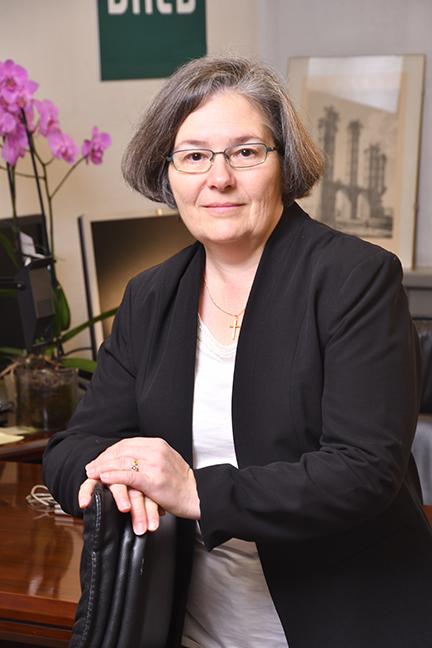
Nancy Konvalinka
When I signed up for a year abroad in Spain, I never imagined I would end up spending nearly forty years (and counting) in Madrid. My parents actually wanted the program director at that time, Professor Daniel Quilter (who is deeply missed), to assure them that I would return to the US afterwards. He did, but…
At the end of my year abroad, I decided to stay an extra year in Spain, teaching English, before finishing my degree at IU in Spanish Language and Literature and in Linguistics, and being inducted into Phi Beta Kappa upon graduation in 1983. Then I promptly returned to Spain.
As Spain did not accept American university degrees, I started the university over again, this time for a degree in Anthropology from the Universidad Complutense de Madrid, while teaching English classes, finishing this new degree in 1988. I became Assistant Director to the Hamilton College Academic Year in Spain where, for over a decade, I put my experience as a study abroad student to good use.
In the meantime, life continued: I married and our two wonderful children were born, keeping us busy. I became an assistant professor in the Department of Social and Cultural Anthropology at the UNED in 2005. I received my doctoral degree in 2008 at the Universidad Nacional de Educación a Distancia (UNED), an "open" university. Again, my undergraduate degree in Spanish helped me to be successful.
I have since participated in several international research projects and won a Wenner-Gren Foundation grant, as well as different Spanish Ministry and university research grants. My research focuses on the anthropology of kinship, family, and life course, with special emphasis on late-forming families and on assisted reproduction and gestational surrogacy. I am currently one of the principal researchers in an ethnographic project on conceptions of motherhood in gestational surrogacy and leader of the Spanish side of an NSF grant led by Dr. Diane Tober (UCSF) to carry out a comparative study of egg donation in Spain and the US.
My degree in Spanish Language and Literature has made a great difference throughout my professional life. Surprisingly enough, it actually made me a better English teacher during the time I taught English, helping me to analyze the specific language difficulties my Spanish-language students encountered. It also enabled me to complete both my undergraduate and doctoral degrees in Spanish universities, to carry out my ethnographic research in Spain, and to gain my position at a Spanish university.
I became a full professor in 2018 and was recently asked to join the Rectoral Team at the UNED. My area of competence is Academic Coordination and Quality, an area that is transversal and exciting in its scope to foster improvements throughout the university community. It is intense but very satisfying, as I work to make my university a better place for everyone involved. In the meantime, my children have grown up and given us five grandchildren to keep us fresh and young at heart.
So, what does this all have to do with my study abroad time? Study abroad involves two main components: language skills and cultural skills. Learning a new language is not just learning how to say the same things in a different tongue; the process always involves using different categories and seeing the world in a new way. You acquire not only language skills, but flexibility in your thinking; you discover a variety of ways to be human and to understand the world you live in. You find yourself constantly in new situations in which you must figure out what is going on and how to deal with unknowns. You learn that there will always be a lot that you do not know and you will always make mistakes, that this is all right and that you can learn from everyone around you. This may sound rather prosaic, but it adds up to a pretty impressive skill set for employment, research, and life.
What was special about the Indiana-Wisconsin-Purdue study abroad program in Madrid that I attended? Perhaps the most important factor was the environment that the staff, Director Daniel Quilter and Assistant Director Kathy Sideli, created. As students, we were given enough space to go our own ways, and enough support to gain confidence in our capabilities. We were encouraged to immerse ourselves in Spanish society and culture and make friends outside of our group.
What advice would I give to present and future study abroad students? First, stay the whole year if you can – a semester is just not enough. Second, make a plan, ahead of time, to limit your contact - phone, WhatsApp, social media, Skype, whatever - with everyone at home. Use these convenient methods to connect with people in your destination country. This might sound like grandma telling you to turn your phone off and talk to people. But the fact is, you cannot be immersed in two contexts at the same time. The time you spend keeping up with every detail of life at home is time that you are not spending in the language and culture of your destination. Yes, you will miss out on a lot of things at home while you are away. But by wholeheartedly devoting yourself to living "mindfully" in the context of your destination, you will gain much, much more that you ever imagined.
Without my study abroad year, I would be somewhere else, perhaps with a different family, job, friends and colleagues; but because of my study abroad year, I find myself in a place that is tremendously rewarding, both personally and professionally.
Alumni Profile: Zak Montgomery (PhD '13, MA '04)
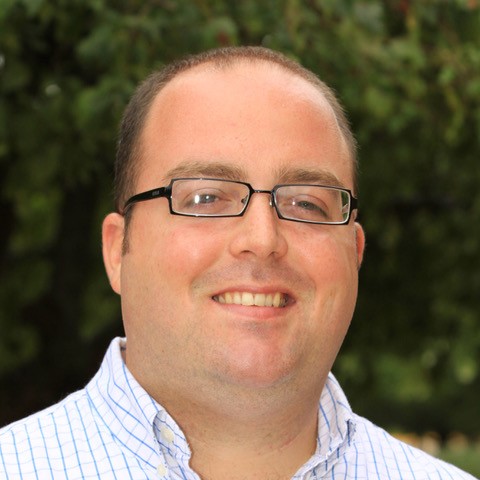
Zak Montgomery
I am grateful to have studied under a number of outstanding graduate faculty at IU, most notably Dr. Darlene Sadlier, whose mentorship helped me make amazing broad and deep connections across the Lusophone and Hispanic worlds that continue to serve me daily in my liberal arts position. I worked closely with the late Dr. Luis Dávila when I was editor of Chiricú in the mid-2000s and took two wonderful courses with the late Dr. Maryellen Bieder, one of the most passionate and thorough educators with whom I've had the pleasure to work. I also enjoyed the mentorship and encouragement of Dr. Reyes Vila-Belda after a chance conversation about La Regenta in the elevator of Ballantine Hall and had the privilege of witnessing two distinguished Lusophone studies scholars, Dr. Luciana Namorato and Dr. Estela Vieira, begin their careers during my last years. I am forever grateful to Dr. Melissa Dinverno and Dr. Alejandro Mejías-López for their rigorous approach to feedback, which has served as a tremendous model for my own teaching. I can't express enough how the mentorship of these faculty (and many others) positively shaped my future intellectual and personal endeavors in ways that I never imagined when I was at IU.
I am currently Associate Professor and Slife Professor in Humanities in the Department of English & Modern Languages at Wartburg College (Waverly, Iowa), where I was humbled to be recognized by colleagues for my research with the Dr. Peggy & Kendall Pruisner Scholarly and Creative Activities Award in 2018, as well as by the student body with the John O. Chellevold Award for Teaching and Professional Service in 2019. I teach a variety of courses in our language programs, including Intensive Portuguese for Spanish Speakers, Intermediate Spanish, Latin American Cinema, Latinos in the United States, Spanish Translation & Interpretation, Spanish for Health Professions, and diversity courses focusing on the Lusophone world for the honors program. In my position, I've also led a May term study abroad to Heredia, Costa Rica five times, as well as immersion courses to Cuernavaca, Mexico and Denver, Colorado. My endowed Humanities position allows me time and resources to do community outreach and recruiting for our Humanities programs at Wartburg, including organizing an annual literary symposium. In 2011, I co-founded the Midwest Undergraduate Conference in the Humanities (MUCH), a venue for budding humanists to present their original research, usually held the first weekend in November. Please consider sending your students to our conference; we've had student presenters from more than 12 states over the years. I'm also proud to say that when I was on the GSAC board at IU, we started the graduate conference that eventually became Diálogos, and I'm so happy to see that event thriving to this day.
My research has taken two directions since graduate school: a literary/cultural studies route, with publications on Lusophone authors such as José Saramago, Pepetela, Antero de Quental, and Portuguese Enlightenment proto-feminist Gertrudes Margarida de Jesus, as well as a new, interdisciplinary path that explores U.S. Latinx identity, particularly how heritage speakers of Spanish view their own cultural and linguistic identities in relation to their educational experiences. The latter has been collaborative research with social science colleagues. I have had to learn qualitative methods of data analysis, which has been challenging, but this new avenue has been very rewarding and applicable to my current position, particularly in my ability to better support the growing number of heritage speakers in our Spanish program.
On a personal note, my spouse, Dr. Sarah Montgomery (Ph.D. in Curriculum & Instruction from IU's School of Education, Associate Professor of Elementary Education at the University of Northern Iowa) and I were fortunate to secure two tenure-track jobs in the same area, and have lived in Cedar Falls, Iowa since leaving IU. We have two children, Xavier (7) and Lucía (4), and our family travels together with my students on May term to Costa Rica, which helps them to better their Spanish skills. We have very fond memories of Bloomington and IU and hope to pay a visit with our family soon.
Jessica Norris (BA '00)
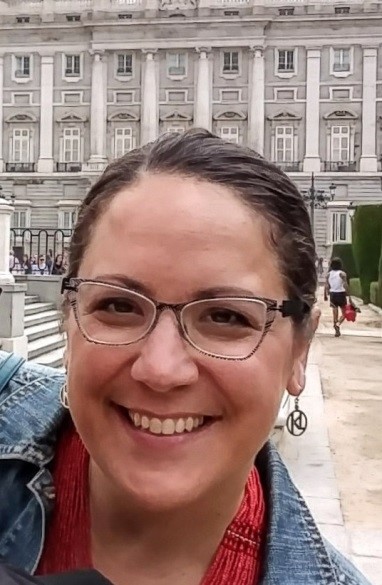
Jessica Norris
My link with Indiana University and Spanish started early. I was a junior. I joined a group of Indiana high school students for a summer language immersion program in San Luis Potosí, Mexico, through IU's Honors Program in Foreign Languages. It is amazing where you can end up when you learn a foreign language. I became a diplomat. Here's my story, and IU is at the center of it.
I started IU in the fall of 1996, thrilled to be a Wells Scholar and overwhelmed by everything the campus had to offer. I loved my Spanish classes. I started Portuguese. That summer, I interned at Senator Lugar's Washington, DC office and added Political Science to my list of interests. I spent my junior year in Santiago, Chile, taking my language skills to the professional level. I graduated in 2000 with a double major in Spanish and Political Science, and a certificate in Latin American Studies.
I got work leading a high school summer exchange program in Spain, then headed to Rio de Janeiro, Brazil, as a Rotary Ambassadorial Scholar. In Brazil, I took graduate classes in international relations and met with Rotary clubs around the region. While completing my Master's in Diplomacy and International Commerce at University of Kentucky's Patterson School, I interned in Washington, DC, at the State Department's Mission to the Organization of American States. Soon, I got a job traveling the world as a State Department contractor doing software training at U.S. Embassies abroad. I spent 600 days on the road in two years!
I loved languages, traveling, and my experiences in government and diplomacy... so I chose to be a Foreign Service Officer. In January 2006, I was sworn into the U.S. Foreign Service, convinced I would soon be assigned to an Embassy in Latin America. Instead, I was sent to five months full-time language training in Malayalam, on my way to two years in Chennai, India. The experience underscored the "worldwide available" clause of my employment.
My 2009-2011 assignment to Havana, Cuba dusted off my Spanish skills. As a vice consul, I adjudicated visa applications and assisted U.S. citizens. After Cuba, I returned to Washington, DC, and worked as a recruiter for the Department of State. My favorite trips were to Bloomington to promote foreign affairs careers among IU students. (See careers.state.gov for more information!) I packed up again in 2013 (it's a theme in the foreign service life) for exotic, diverse Kuala Lumpur, Malaysia, where I ultimately served as the Consul General, overseeing consular operations.
In 2016, twenty-one years after my high school summer ignited my passion for Spanish and world travel, I returned to Mexico, this time as the State Department's officer at the Mexican Foreign Ministry. I promoted cooperation on bilateral consular issues, including crisis preparedness and documenting U.S.-born dual national children for access to education and social services. In 2017, I became the visa chief at the U.S. Embassy in Mexico City, one of the world's largest visa operations, leading a team of 70-plus officers and staff processing visas for travelers headed to the United States to visit, work, and study. It's an honor to be a part of such important work to build people-to-people ties between the United States and Mexico, while at the same time improving security.
Mexico City is amazing, but a city of 23 million can overwhelm when you are from a town of 5,000 (Monticello, IN). I was fortunate to meet the IU alumni group here, and I'm so proud of IU's focus on international engagement and global education. Since I've been here, President and Mrs. McRobbie have visited twice, IUPUI Chancellor Paydar brought a large delegation, IU has opened a Gateway Office to build academic connections, and the IU men's soccer "sports ambassadors" came for exhibition games. IU grads are everywhere! I'd encourage alumni to reach out to the network in your city, or start your own.
Language learning makes you a better communicator. Business, medicine, diplomacy—all these careers hinge on talking to others. I built my diplomatic career with IU language studies. Even if you don't pursue a language, I hope you take the opportunity to study abroad. And did I ever go back to San Luis Potosí? Last year, more than two decades later, I returned to celebrate the journey IU helped me launch that summer.
Alumni Notes
We gratefully acknowledge the support of our alumni through different initiatives and contributions that foster the excellence of our department. We are excited to share the updates we have received and look forward to continuing to hear about the endeavors of our alumni.
Please keep in touch! Email: lagaceta@indiana.edu.
Renato Alvim (PhD '10) is currently an assistant professor at California State University-Stanislaus, teaching Portuguese language, Lusophone culture and Spanish. He was recently awarded the Elizabeth Anne B. Papageorge Faculty Development Award, in part for revitalizing the Portuguese program at Stan State, as well as building meaningful relationships with his students and colleagues.
Shirley Choy Zaragoza (MA '82) "Retired after 37 years of teaching. It all started here at IU when I taught Spanish as an instructor. It was such a wonderful experience that I went back for a post-graduate degree in education; I just recently retired from being a professor for BMCC, City University of New York after 31 years full-time teaching there. Thank you to all my wonderful professors at IU; learning the ability to teach Spanish and studying Spanish literature will forever be part of my soul and passion."
Morris Gevirtz (MA '13) "After four years of living in Turkey, running my own language school and learning pretty darn good Turkish, I find myself in the Bay Area of California, working at a linguistics tech company. I'm the head of operations and the only linguist here! Our product (I hate to drink the proverbial cool-aid) has the power to change linguistics research. I bought a sailboat which is also my home. The boat is wonderful to sail and repair, and amazing for the lover of language! For example, I have been exploring the history of boating etymology and metaphor. Pretty fertile ground (pardon the reverse pun)."
Rafael Gómez (PhD '93) "In the last two years, I have served as Associate Vice President North/CFA Board of Directors in the California Faculty Association, a faculty labor union of 28,000 professors, lecturers, librarians, counselors and coaches who teach in the California State University system. This is in addition to my duties as Professor of Spanish at California State University, Monterey Bay."
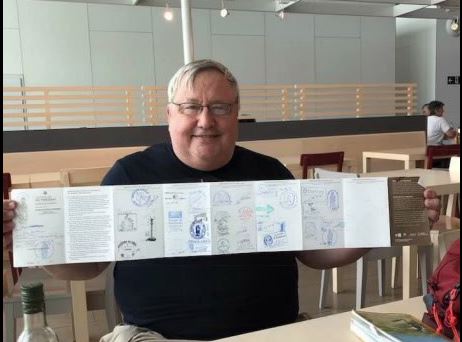
Hartleroad with his stamped pilgrim's passport.
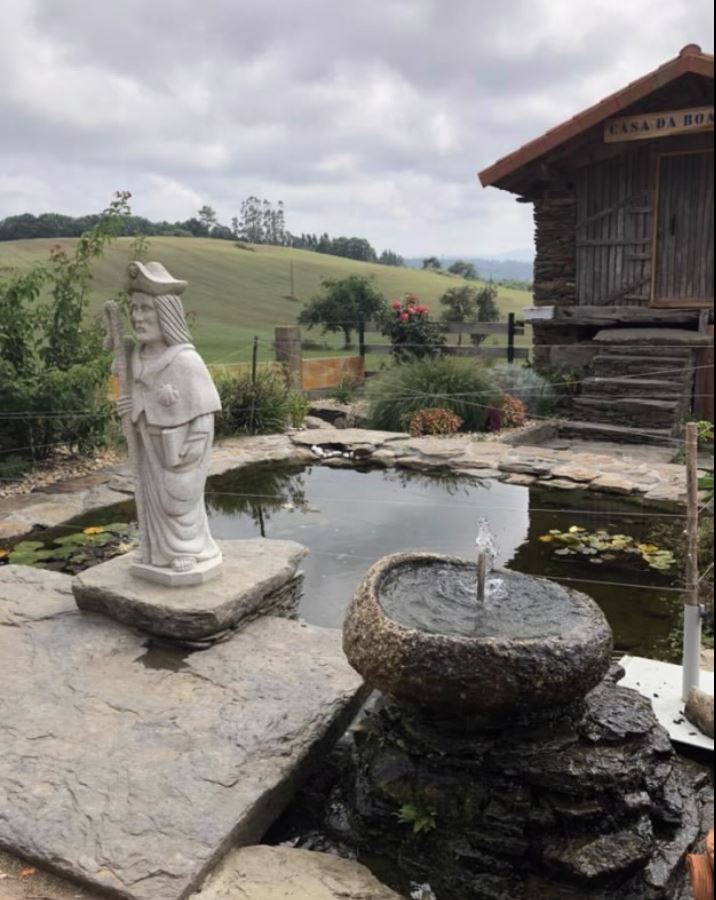
Kim Hartleroad (BA '73) "Ever since graduating from IU, I wanted to travel to Spain. I had the opportunity last August when I decided to walk the Camino of Santiago de Compostela. Walking the Camino, known in English as the Way of Saint James, follows a tradition pilgrims have done from the time of the discovery of St. James's remains in 812 AD.
I became one of 300,000 pilgrims who walk the routes to Santiago de Compostela each year. The longest route, the French Way, starts from St. Jean Pied de Port in France and ends in Santiago de Compostela in Spain; in all, about 495 miles. Manypeople, myself included, take a shorter route. I started from the town of Sarria, traveling 62 miles through the towns of Portomarin, Palas de Rei, and Arzua to take some time to enjoy the culture and architectural marvels, like the Iglesia Santa Mariña de Sarria, the Sarria Peregrino, and the Iglesia de San Salvador, and to enjoy the verdant countryside and wonderful hospitality of Galicia. When you travel one of the approved routes, you carry a passport and have it stamped along the way at various stops. With at least two "sellos" per day you are eligible to receive a certificate of completion.
At the catholic mass in the Cathedral of Santiago, we witnessed the swinging of the famous "botafumeiro", an enormous incense burner that is controlled by four people as it is lifted high above the congregation and swung back and forth at the end of the service.
Before and after the actual walk, my travelling partner and I enjoyed a few days in Madrid. I was thrilled to find a Peruvian restaurant very close to our hotel. The authentic food there brought back memories of my IU experience with my year abroad in Peru in 1971. We also visited the Prado and took in the treasures of art in this famous museum. Also, since graduating from IU, I had obtained a winemaking certification and was able to sample the wonderful cuisine and wines of Galicia, including the Albariño and Mencia wine, very popular in this part of the world."
Caroline Oates (BA '18) "I graduated with Spanish and American Studies majors. Despite studying Spanish, I received a 2019 Fulbright English Teaching Assistant grant to Brazil. I'm living in the state of Rio Grande do Sul in the south of Brazil, learning Portuguese, and teaching classes about a variety of issues in English. I am also helping my university (UNISINOS) create an English writing center to support internationalization efforts by helping professors and graduate students publish in English."
Bob Rich (BA '60, MA '64) "My 59th year of teaching Spanish, only in my home now, one class. Enjoy traveling and family. I was widowed in 2013. Both of my children teach, using Spanish daily."
Kristen Sisk (BA '87) "I graduated with a double major in Psychology and Spanish. After graduating, I moved to California and was able to use my Spanish skills to pass a language/culture test and taught with an emergency credential in Spanish at a bilingual school in LA. I went back to school while teaching to earn my teaching credential in Elementary Education. It was a very interesting and exciting experience. My studies at IU really helped to prepare me. I also taught as a bilingual 5th grade teacher in Denver, CO. I now have been the ELL teacher at Penrose Elementary School for 20 years and have earned a Masters in Culturally Diverse Learners. I really fell into a teaching career, not knowing exactly what I wanted to do. I just knew education would lead me somewhere."
Linda Zee (PhD '93) "I have been teaching at Utica College in Utica, NY since 1997 and recently retired. I hope to continue to take students to Ecuador, which I have been doing for several years now. In retirement, I plan to write two novels, travel, translate and keep my husband, a professional brewer of craft beer, out of trouble."